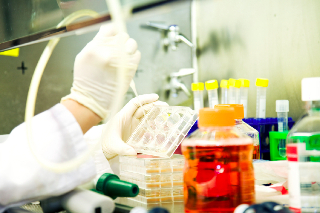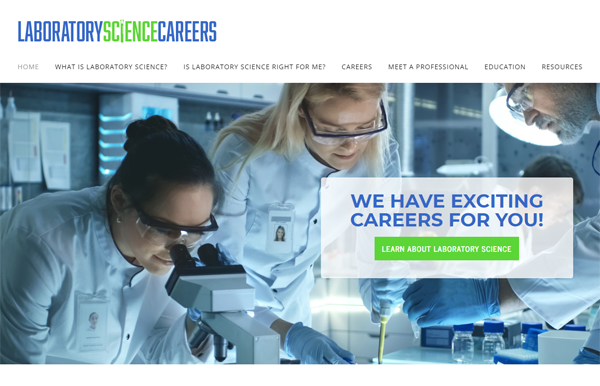What is a medical laboratory science professional?
Medical laboratory science professionals, often called medical laboratorians, are vital healthcare detectives, uncovering and providing laboratory information from laboratory analyses that assist  physicians in patient diagnosis and treatment, as well as in disease monitoring or prevention (maintenance of health). We use sophisticated biomedical instrumentation and technology, computers, and methods requiring manual dexterity to perform laboratory testing on blood and body fluids. Laboratory testing encompasses such disciplines as clinical chemistry, hematology, immunology, immunohematology, microbiology, and molecular biology. Medical laboratory science professionals generate accurate laboratory data that are needed to aid in detecting cancer, heart attacks, diabetes, infectious mononucleosis, and identification of bacteria or viruses that cause infections, as well as in detecting drugs of abuse. In addition, we monitor testing quality and consult with other members of the healthcare team.
physicians in patient diagnosis and treatment, as well as in disease monitoring or prevention (maintenance of health). We use sophisticated biomedical instrumentation and technology, computers, and methods requiring manual dexterity to perform laboratory testing on blood and body fluids. Laboratory testing encompasses such disciplines as clinical chemistry, hematology, immunology, immunohematology, microbiology, and molecular biology. Medical laboratory science professionals generate accurate laboratory data that are needed to aid in detecting cancer, heart attacks, diabetes, infectious mononucleosis, and identification of bacteria or viruses that cause infections, as well as in detecting drugs of abuse. In addition, we monitor testing quality and consult with other members of the healthcare team.
The medical laboratory science profession has more than one career track based on level of education: medical laboratory technician (2 years) and medical laboratory scientist (4 to 5 years). Medical laboratory technicians are competent in the collection, processing, and analysis of biological specimens; the performance of lab procedures; the maintenance of instruments; and relating lab findings to common diseases/conditions. Medical laboratory scientists have a more extensive theoretical knowledge base. Therefore they not only perform laboratory procedures including very sophisticated analyses, but also evaluate/interpret the results, integrate data, problem solve, consult, conduct research, and develop new test methods.
In order to participate in a medical laboratory science educational program, students must be able to comply with program-designated essential functions, or request reasonable accommodations to execute these essential functions. Requirements include a sound intellect; good motor skills: eye-hand coordination and dexterity; effective communication skills; visual acuity to perform macroscopic and microscopic analyses or to read procedures, graphs, etc.; professional skills such as the ability to work independently, to manage time efficiently, to comprehend, analyze, and synthesize various materials, as well as to hold sound psychological health and stability.
A solid foundation in high school biology, chemistry, and math usually provides the groundwork for medical laboratory science education. A career as a medical laboratory technician requires completion of either an associate degree program integrating general education, science, and medical laboratory science courses; or a shorter certificate program that focuses on technical courses. The medical laboratory technician curriculum addresses the theoretical and practical aspects of each of the major laboratory disciplines. Medical laboratory scientists complete a baccalaureate degree program that includes more in-depth courses than the technician classes as well as management and education courses. Such courses may be offered through a hospital-based program that provides the senior year for students from affiliated universities. An integrated university-based program provides professional coursework prior to a shorter clinical experience, e.g., five to six months. Such a program usually is found in a major university or academic medical center. College science graduates who meet a program's prerequisites are also eligible to apply to a medical laboratory science program.
Accreditation of medical laboratory science or technician programs by the National Accrediting Agency for Clinical Laboratory Sciences (NAACLS) ensures that the programs maintain high educational standards (visit www.naacls.org for a list of accredited programs and contact information). Masters and doctoral programs are also available in medical laboratory science for those who wish to further their education.
Articulation in education refers to any arrangement used by colleges and universities to coordinate the curriculum of their program that will facilitate the transfer of credits so that students can move from one level to another and decrease the time needed to earn the next level of degree. Individuals who have graduated from a NAACLS-accredited Clinical Laboratory Technician/Medical Laboratory Technician (CLT/MLT) program may be eligible, in some programs, to obtain a bachelor's degree in Clinical Laboratory Science/Medical Technology (CLS/MT) without repeating courses common to both degrees. In addition, portions of the clinical practicum may be waived in those areas in which you are proficient. Typically the program director/advisor will work with you to individualize your program of instruction based on your educational, clinical, and/or work experiences.
There are many articulated programs across the nation which offer opportunities to individuals with an associate degree in CLT/MLT to complete their BS degrees and become certified as a medical laboratory scientist. These programs are either on campus programs or have online offerings. The requirements for articulation vary by program (e.g., some may require experience as a CLT/MLT or certification as a CLT/MLT and others may not) so it is important to check with individual institutions for their requirements.
The Bureau of Labor Statistics of the U.S. Department of Labor projects that the employment of medical laboratory technicians and scientists will increase by 14 percent through the year 2026. According to Jobs Rated Almanac, medical laboratory science has 25 percent job growth and good job security. Among health related professions, it currently ranks third. In 2015, the median salary for medical laboratory technicians was about $41,420, and $60,520 annually for medical laboratory scientists, based on geographic location. Currently there is a shortage in many parts of the country guaranteeing employment and higher salaries for graduates.
Laboratory science is a critical healthcare field that impacts the health of every individual! Now is the perfect time to pursue a career in the laboratory sciences because there are tons of job opportunities available offering good salaries and lots of room for advancement.
Careers in laboratory science are perfect if you are analytical, enjoy problem solving, and are interested in the science of healthcare. Whether working as a medical laboratory professional, cytotechnologist, or histotechnologist, there are a variety of opportunities requiring different levels of education and training.
Learn more at:

